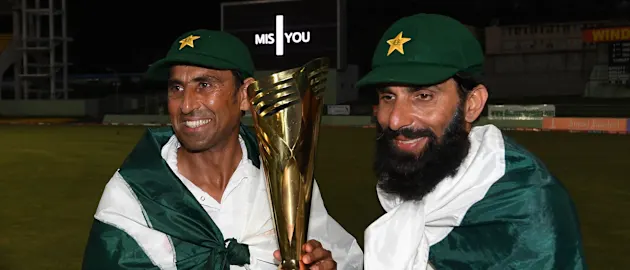Misbah & Younus - Pakistan’s milestone men


Misbah Ul Haq and Younus Khanleave the Test arena with 193 matches, 15,321 runs and 151 sixes between them – not to mention nine wickets – but what other statistical highlights have they contributed over their long and illustrious careers?
Younus debuted first and wasted no time, becoming at the time just the seventh Pakistan batsman to score a century on his Test debut, when he followed up his first innings 12 with an innings of 107 against Sri Lanka at Rawalpindi ne arly 2000. It was the first of what would end up a record 34 centuries for Pakistan – leaving Inzamam-ul-Haq’s previous record of 25 far behind.
It wasn’t just the volume of his centuries which has been remarkable, but the way he has been able to adapt his game to the geographical variety of Test Match locations was superb. He has played Test cricket in 11 different countries and – uniquely – has scored Test centuries in all 11 of them.
In addition, he has been surprisingly consistent across all four innings of a Test Match. His averages across the innings are all impressive – an amazing achievement in an environment where players consistently perform far better in the first innings than the last.
|
Innings |
Runs |
Average |
| 1 |
2918 |
53.05 |
|
2 |
3282 |
56.58 |
|
3 |
2434 |
46.80 |
|
4 |
1465 |
50.51 |
It was in his final series – on 23 April 2017 that he reached the landmark of 10,000 Test runs – the 13th batsman to reach that figure and the sixth-fastest in terms of innings (208).
So often batsmen have been overcome by nerves when approaching landmarks in their innings, but not for him a case of the ‘nervous nineties’!. However, after having been dismissed for 91 against New Zealand at Auckland in March 2001, he converted a record 32 successive scores on 90+ into centuries over the rest of his career, bettering Don Bradman’s record of 29, which itself is a long way ahead of Kumar Sangakkara’s third-place 23. That innings remained his only dismissal in the 90s in his entire career.
Like most great players, he had a landmark inning which came against Sri Lanka in Karachi in 2009 when he struck 313, becoming just the third Pakistan batsman to score a Test triple-century, after Hanif Mohammad and Inzamam.
That innings took him to the top of the ICC Test Batting rankings, a position he occupied for a total of seven matches and 71 days, peaking at 880 points, the third-highest points tally ever achieved by a Pakistan batsman in their Test history.
An excellent slip fielder, he is the only Pakistan player to take more than a hundred catches in the field, and his current total of 137 is half as many again as the next man on the list – Javed Miandad – who took 93 over the course of his career.
Let us not forget his bowling. A somewhat erratic leg-spinner, he did end his career with nine Test wickets, with a best of 2 for 23 coming against Sri Lanka at Galle in 2009 – a match in which he actually took four of his nine total wickets. But his bowling hit the headlines for the wrong reasons at Hamilton in 2001 in what was just his 12th Test. On the fourth day, Craig McMillan hit 26 runs from his over, setting a new record (subsequently broken) for the most runs in an over in Test cricket.
Pakistan’s most successful captain in terms of matches and wins delivered, Misbah-ul-Haq finally gave Pakistan the stability they had long desired at the helm. His 56 matches and 26 victories in charge are national records, ahead of Imran Khan’s tally of 48 and 14 respectively.
His first Test appearance came in March 2001, but unlike his long-term team-mate, he struggled and was dopped after five Test appearances in which his highest score was just 28. It took him more than four years to work his way back into the Test team, but once he did in 2007 he became a vital cog in the middle order.
Possessing two styles – namely ‘block’ or ‘blast’ epitomised by his first innings in his final Test when at one stage he had scored just one run from 51 balls on his way to his final score of 59. Despite the fact that he could often be as obdurate an opponent as any, he ended his Test career with a national record of 81 sixes in Test cricket, ahead of more celebrated big-hitters like Imran Khan, Wasim Akram and Shahid Afridi.
Nowhere was this big hitting more demonstrated than against Australia at Abu Dhabi in early November 2014 when he followed up his first-innings score of 101 by slamming what was at the time the joint-fastest Test century from just 56 deliveries – equalling the record set by Viv Richards in 1986 which many thought unbreakable. Ironically, Brendon McCullum would do just that two years later with a 54-ball effort also against Australia at Christchurch. Misbah’s century took just 74 minutes, four minutes longer than Jack Gregory’s record effort for Australia against South Africa in 1921.
Misbah could console himself with the fact that he reached his fifty from just 21 deliveries which did set a new Test record, bettering Jacques Kallis’s 24-ball effort for South Africa against Zimbabwe at Cape Town in 2005. The 24 minutes it took also set a new record, removing Mohammad Ashraful from the record books, who took 27 minutes for Bangladesh against India at Mirpur in 2007.
Unlike many players whose skills wane in later life, Misbah was still able to perform on the highest stage in the twilight of his career. At Lord’s in July 2016 he led his side to a memorable triumph, scoring a century at the age of 42 years and 47 days, the oldest man since Patsy Hendren in 1934 to score a Test century. He also became the oldest Test captain to reach three figures, beating Bobby Simpson’s previous record.
Whereas Younus never seemed to struggle in the 90s, it was a different story for Misbah. Over the course of his career, he passed fifty on 49 occasions, but was able to convert only ten of those scores into centuries. Nowhere was this demonstrated more than in his final series against the West Indies, in which he ended on 99 on two occasions, making him the only batsman in Test history with three such scores to his name.
Misbah never reached top spot in the ICC Test Batting rankings, but his highest points tally of 842 – achieved in November 2014 – was good enough for fifth place and remains the fifth-highest tally ever recorded for Pakistan.
Among all the individual achievements, none probably mattered as much as leading Pakistan to the top of the ICC Test Championship in August 2016, following their 2-2 drawn series in England. They didn’t spend long in the top spot, but it was the culmination of the combination of his leadership and the stability he brought to an often-fractious team which saw them rise to that position.
Unsurprisingly for tow middle-order stalwarts, they ended as Pakistan’s most prolific batting combination, adding 3213 runs together in 53 partnerships at an average of 68.36. They shared 15 hundred partnerships, also a national record and good enough for joint-fifth place on the all-time list with Jack Hobbs and Herbert Sutcliffe – not bad company to be in.
Pakistan have big shoes to fill to try to replace these two great batsmen. But who would bet against them continuing the line of modern-day middle-order greats which has stretched from Zaheer Abbas to Javed Miandad to Mohammad Yousuf to these two.


